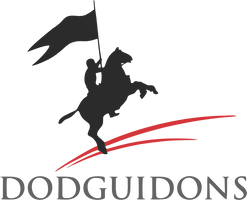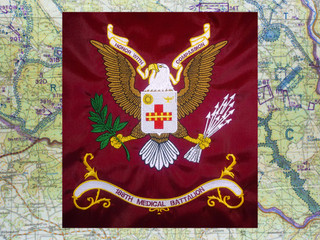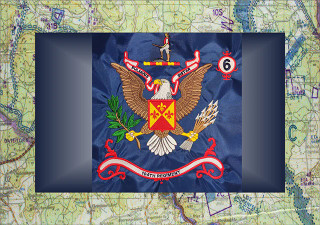Embroidery Area is 10"x11" sewn on nylon fabric that measure 18"x18"
We do not frame
Description/Blazon
A Gold color metal and enamel device 1 1/8 inches (2.86 cm) in height overall consisting of a shield blazoned: Argent, a cross Sanguine charged with a sprig of oak fructed Proper, on a chief Vert two swords in saltire of the first hilted Or. Attached at bottom, a Maroon scroll inscribed "SOLDIER MEDIC."
Symbolism
Maroon and white are the colors associated with the Medical Corps. Green expresses hope and regeneration. The cross is a symbol of healing and caring. The acorn and oak leaves are symbols of potentiality, strength and endurance. Army combat medics receive their start or initial medical training in this unit. The crossed swords stand for combat readiness and commemorate the two wars (World War II and Korean War) in which this unit received battle honors.
Background
The distinctive unit insignia was authorized on 29 February 1988.
Description/Blazon
Shield
Argent, a cross Sanguine charged with a sprig of oak fructed Proper, on a chief Vert two swords in saltire of the first hilted Or.Crest
On a wreath of the colors Argent and Sanguine two laurel branches Or each entwined with three ribands Gules, Argent and Vert, enclosing a Korean taeguk Proper; overall an oriental dragon erect of the third, fumant of the fourth.Motto
SOLDIER MEDIC.Symbolism
Shield
Maroon and white are the colors associated with the Medical Corps. Green expresses hope and regeneration. The cross is a symbol of healing and caring. The acorn and oak leaves are symbols of potentiality, strength and endurance. Army combat medics receive their start or initial medical training in this unit. The crossed swords stand for combat readiness and commemorate the two wars (World War II and Korean War) in which this unit received battle honors.Crest
The wreath of laurel stands for honor and accomplishment; gold is symbolic of excellence. The ribands around the wreath represent the flag of Italy and denote the unit's participation in the World War II Rome-Arno Campaign and the Meritorious Unit Commendation (Italy). The aggressive, oriental dragon and the taeguk refer to the unit's service in Korea. The battalion earned four campaign participation credits and received the Republic of Korea Presidential Unit Citation.Background
The coat of arms was authorized on 29 February 1988. The coat of arms was amended to correct the description of the crest on 19 September 2001.







